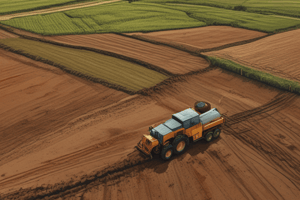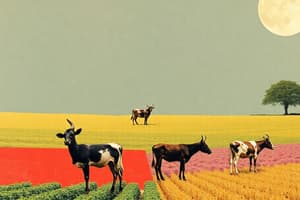Podcast
Questions and Answers
What are the Latin origins of the word 'agriculture' and what do they mean?
What are the Latin origins of the word 'agriculture' and what do they mean?
The word 'agriculture' is derived from 'Ager,' meaning land or field, and 'Cultura,' meaning cultivation.
Explain the dual nature of agriculture as both an art and a science.
Explain the dual nature of agriculture as both an art and a science.
Agriculture is an art that involves skillful operation of farming and a science that utilizes modern technologies and scientific principles for crop production.
What is the primary aim of agriculture in relation to land management?
What is the primary aim of agriculture in relation to land management?
The primary aim of agriculture is to increase land productivity while protecting it from deterioration and misuse.
Describe how agriculture is viewed as a business.
Describe how agriculture is viewed as a business.
List three human needs that agriculture helps to fulfill.
List three human needs that agriculture helps to fulfill.
What role do modern technologies play in agriculture?
What role do modern technologies play in agriculture?
How does the systematic raising of plants and livestock contribute to agricultural productivity?
How does the systematic raising of plants and livestock contribute to agricultural productivity?
What are some examples of modern agricultural practices mentioned in the content?
What are some examples of modern agricultural practices mentioned in the content?
What is the role of agricultural supplies and services in food production?
What is the role of agricultural supplies and services in food production?
How could biodiesel from Jatropha contribute to the economy?
How could biodiesel from Jatropha contribute to the economy?
In what ways does agriculture provide revenue for governments?
In what ways does agriculture provide revenue for governments?
Why is the balance of gaseous concentrations in the atmosphere important?
Why is the balance of gaseous concentrations in the atmosphere important?
What is the projected arable land per person by 2050, and why is this concerning?
What is the projected arable land per person by 2050, and why is this concerning?
How significant is agriculture to the GDP of the Philippines?
How significant is agriculture to the GDP of the Philippines?
What challenges does the decline in agricultural land pose for the Philippines?
What challenges does the decline in agricultural land pose for the Philippines?
Which ASEAN country’s agricultural production includes the highest tonnage of rice?
Which ASEAN country’s agricultural production includes the highest tonnage of rice?
What was the recent trend in livestock production in the Philippines as reported in 2021?
What was the recent trend in livestock production in the Philippines as reported in 2021?
How does increasing population pressure affect agricultural land globally?
How does increasing population pressure affect agricultural land globally?
Flashcards are hidden until you start studying
Study Notes
Definition of Agriculture
- Derived from Latin "Ager" (land) and "Cultura" (cultivation).
- Involves cultivation of land to produce crops and livestock for economic purposes.
Aspects of Agriculture
- Science and Art: Combines knowledge and skillful management of farming operations.
- Business: Focuses on maximizing net return through efficient management of resources (land, labor, water, and capital).
Importance of Agriculture
- Essential for producing food, shelter, and clothing.
- Provides agricultural supplies, services, and the processing, marketing, and distribution of products.
- Contributes to fuel production (e.g., biodiesel from Jatropha).
- Generates income and employment opportunities.
- Exports agricultural products, earning foreign currency and fostering international relations.
- Government revenue from taxes and rent on agricultural land.
- Enhances natural beauty through cultivation of flowers and ornamental plants.
- Helps maintain environmental balance by regulating atmospheric gases.
Global Food Production Context
- World population projected to grow from 7.8 billion to 9.9 billion by 2050.
- Increased demand for food due to population growth, especially in developing countries.
- Only 10% of the world's land is arable, with significant portions unsuitable for agriculture.
- Arable land per capita expected to decrease to just over one-tenth of a hectare by 2050.
Agriculture in the Philippines
- Agriculture contributes 9.6% to GDP but has declined by -0.3%.
- Export earnings dwindled in recent years, highlighting economic challenges.
- Overall agricultural production value fell by 1.7% in 2021.
- Notable decreases in livestock and poultry production.
ASEAN Agricultural Region
- Comprises 10 member countries with significant agricultural outputs.
- In 2012, notable production included 129 million tons of rice and 40 million tons of corn.
- Established as one of the world's most productive agricultural regions.
Challenges in Philippine Agriculture
- Population of 109 million; total land area of 30 million hectares.
- Agricultural land decreased to 13.32 million hectares by 2018, impacting farm output.
- A reported 1.3% decline in agricultural crop harvest area in 2019, indicating productivity challenges.
Studying That Suits You
Use AI to generate personalized quizzes and flashcards to suit your learning preferences.




